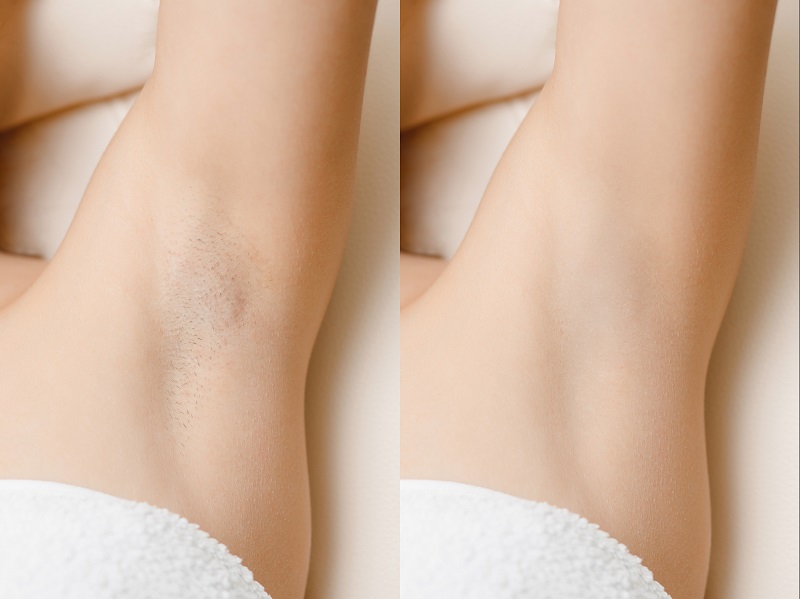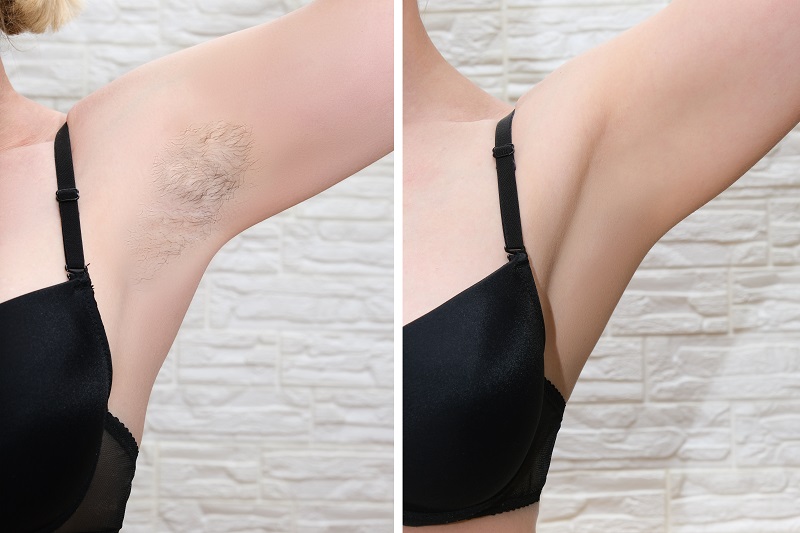To achieve smooth, hairless skin, several hair removal methods are at your disposal. Each has its advantages and downsides.
In this article, we discuss two of the most popular hair removal methods: laser and waxing.
Let’s see how these treatments work, how they differ, and which is a better option for your skin and hair type.

Laser Hair Removal: Overview
Laser hair removal is a cosmetic treatment involving the use of a laser that destroys hair follicles and prevents hair growth. For long-lasting results, patients need to undergo several treatments.
Waxing Hair Removal Overview
Waxing is a hair removal method where the cosmetic practitioner removes hairs in the target area using wax. The hairs typically grow back after three to six weeks, but long-term use may diminish or stop hair growth in certain areas.
Waxing vs. Laser Hair Removal: How Do They Differ?
The following table shows the main differences between laser and waxing.
| Laser Hair Removal | Waxing | |
| How does it work? | A laser beam heats and destroys a hair follicle. | Wax pulls hair from the hair root. |
| Common treatment areas | Upper lip, chin, armpits, arms, chest, legs, bikini line, shoulders, and back. | Upper lip, chin, armpits, arms, chest, legs, bikini line, shoulders, and back. |
| Pain level | Minimal - the treatment includes a numbing cream. | Mild to strong, depending on the patient’s pain threshold. |
| Side effects | Common: Redness, swelling, discomfort Rare: Skin discoloration, scarring, excessive hair growth | Common: Redness, swelling, discomfort With long term use: ingrown hairs |
| Longevity of results | Several years, in some cases permanent. | Three to six weeks. |
| Treatment duration | A few minutes to one hour, depending on the area. | A few minutes to half an hour, depending on the area. |
| How many treatments are required? | An initial series of 4-8 treatments spaced 1-3 months apart, and a few years of annual maintenance treatments. | Every 3-6 weeks. |
| Eligible candidates | Preferably, people with light skin and thick, dark hair. | Anyone |
| Cost | $150 - $450+ | $15 - $100+ |
Laser vs. Waxing: Treatment Areas
Laser hair removal and waxing can both be done on most body parts. Common waxing and laser hair removal areas are:
- Face (upper lip, chin)
- Legs
- Bikini line
- Chest
- Shoulders
- Back
- Armpits and arms
Note: Estheticians avoid treating the area around the eyes to avoid the risk of eye damage. However, with the necessary precautions, it is possible to use lasers to remove eyebrow hairs. Learn how laser hair removal for eyebrows works.
Laser vs. Waxing: Benefits
Both hair removal treatments have their advantages and disadvantages. They help patients decide which method to use.
Laser
- Long-lasting (in some cases, permanent) results
- Mild or no pain
Waxing
The benefits of waxing include:
- Safe procedure
- Suitable for all skin and hair types
- Budget-friendly
Laser vs. Waxing: Procedure
Find out what to expect when you come to a waxing or laser hair removal appointment.
Laser
- The medical provider gives you protective goggles and applies a numbing cream to the treated area.
- The medical provider then points a laser device at the target area.
- The device sends light to the hair follicles, targeting the pigment melanin. The pigment absorbs the light, which turns into heat. The heat burns and damages the hair follicle, inhibiting hair growth.
A single laser hair removal appointment can take anywhere between a few minutes to an hour.
Waxing
- The cosmetic practitioner warms the wax.
- They apply the wax on the target area with a wax applicator or spatula in the direction of hair growth, and then presses a fabric strip over the wax.
- After waiting for several seconds for the wax to cool and grip onto the hair, the esthetician pulls the fabric strip in the opposite direction of hair growth, pulling hairs from the root. In some cases, they don’t use fabric strips but pull the hardened wax.
A waxing appointment lasts anywhere between 5 and 30 minutes, depending on the target area.
Laser vs. Waxing: Pain
Several factors determine how painful a hair removal session will be, such as the patient’s hair thickness, pain threshold, health status, etc. The following are general observations from patients regarding pain and discomfort during laser and waxing treatments.
Laser
Laser hair removal isn’t painful because the medical provider applies a numbing cream prior to treating the area with a laser. However, the patient may feel a slight tingling or pricking sensation, particularly in areas with denser and thicker hair.
Waxing
Patients report different pain levels. People with a lower pain threshold may experience the treatment as painful, especially in areas with sensitive skin or dense and thick hair. Fortunately, the pulling action is quick, and the pain lasts only a few seconds.
Laser vs. Waxing: Results
You can expect the following results from each treatment.
Laser
The goal of laser hair removal is to ensure long-lasting or permanent hair removal. A series of four to eight treatments spaced one to three months apart is necessary to reach that goal because hairs in different hair follicles are in different growth stages. One laser treatment may damage hair follicles from which the hairs are growing but won’t affect follicles in the resting phase.
The number of necessary treatments depends on the patient’s skin and hair type.
After each treatment, the hairs gradually shed from the follicles. After a series of four to eight treatments, the patient may need annual or bi-annual maintenance treatments for a few years. Patient experiences show that after a few years of maintenance treatments, hair growth is either sporadic or permanently inhibited.

Waxing
The results of hair waxing are temporary. The procedure doesn’t damage the hair follicle but only pulls the hairs out with the root. The hairs usually grow back after three to six weeks, depending on the patient. After long-term use, hairs may thin out or stop growing in certain areas. With long-term use, there is a risk of developing ingrown hairs.

Laser vs. Waxing: Aftercare
Follow these aftercare tips to maximize the effects of both treatments and minimize the chances of side effects.
Laser
- Avoid exposure to heat.
- Avoid activities that cause sweating.
- Avoid chemical peels.
- Apply ice to the treatment area if necessary.
Waxing
- Avoid exposure to heat.
- Avoid exercise and activities that cause sweating.
- Wear loose-fitting clothes.
- Don’t apply pressure to the treated area.
- Wash hands before touching the treated area.
- Exfoliate the treated area to prevent ingrown hairs.
Laser vs. Waxing: Side Effects
Laser hair removal and waxing are considered safe for most healthy adults. However, patients may experience certain side effects.
Laser
- Redness
- Swelling
- Slight discomfort
These common side effects occur during the first few hours after the laser treatment and subside quickly.
Patients rarely experience the following symptoms:
- Skin discoloration
- Blistering
- Scarring
- Excessive hair growth
Waxing
The common side effects of waxing are the same as those of laser hair removal. However, frequent waxing can cause the hair to grow crooked due to the pulling motion. This can result in ingrown hairs, which cause a whole set of issues.
Note: Learn how to prepare for laser hair removal to ensure optimal results and minimize side effects.
Laser vs. Waxing: Who Is a Good Candidate?
Some hair removal methods are not suitable for everyone.
Laser
The best candidates for laser hair removal are people with dark body hair and light skin. This is because the contrast between the skin and hair color is strong enough for the laser to target only the melanin in the hair and not damage the skin.
More technologically advanced laser devices that treat a wider range of skin and hair color combinations are now used in many med spas.
Note: Read our article and find out more about laser hair removal for blonde hair.
Waxing
Almost anyone is eligible for waxing. It's important that your hairs are at least a quarter of an inch long to ensure the procedure’s effectiveness. However, if you have sensitive skin, you may experience more severe side effects.
Laser vs. Waxing: Cost
The patient’s budget often determines which hair removal treatment they choose.
Laser
The cost of laser hair removal depends on the size of the treatment area. It ranges from $150 to $400+ per treatment. The pricing of laser hair removal at Vibrant Skin Bar is as follows:
- Laser hair removal for a large area - $350 - $450
- Laser hair removal for a medium area - $250 - $350
- Laser hair removal for a small area - $150 - $250
Waxing
Depending on the size of the treated area and the location of the salon, the price of waxing ranges between $15 and $100+. One waxing treatment is less expensive than a laser hair removal treatment, but the cost of waxing during the patient’s lifetime by far exceeds the total cost of laser treatments.
Is it Better to Wax or Do Laser?
It’s best to consult your medical provider to determine which hair removal method is better for your skin type, hair color, pain threshold, desired results, and budget.
They may recommend laser hair removal if you want to avoid frequent visits to the salon. If you have light hairs, waxing may be more effective.
Conclusion
Laser and waxing are among the most popular hair removal methods today. The only thing they have in common is their final goal—hair removal. In fact, these two procedures are quite different in the method, pain level they cause, cost, and longevity of results.
We recommend you carefully research both treatments to determine which hair removal method is right for your needs.


